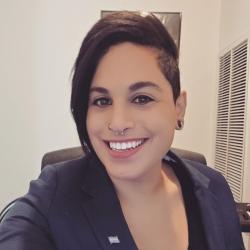Answering the Call
An ardent advocate for the LGBTQ+ community, Alejandra Caraballo is a shining star within the legal profession and abroad. Currently, Caraballo is a Clinical Instructor for the Cyberlaw Clinic situated in Harvard Law School’s Berkman Klein Center for Internet & Society. Her focus is on the intersection of gender and technology, working with students on cases related to copyright infringement and providing legal advice to nonprofit organizations. She prides herself on being a mentor for her students, particularly her LGBTQ+ students, as she recognizes the impact representation has on students seeking guidance and support for their career.
Caraballo has always had a passion for law and policy. In college, she committed her free time to working on various political campaigns. Despite this, it wasn’t until her chemistry professor proposed she pursue a career in the law and apply to law school when she seriously took the prospect of working in the legal field under consideration. After her undergraduate studies, she attended and graduated from Brooklyn Law School, where she found her love for public interest work. While in law school she worked for a variety of clinics including the Elder Law Clinic, representing low income seniors facing eviction and housing discrimination; and the Safe Harbor Clinic, assisting asylum seekers with their cases.
Social Media As a Tool for Advocacy
At the Cyberlaw Clinic, Caraballo spends time researching the power of technology and its weaponization against LGBTQ+ people and threats to women’s rights. Through her research and her own activities online, she understands the power of social media and how it can be a double-edged sword for the LGBTQ+ community. Although she believes that social media is an underutilized tool for organizing, she sees that as a consequence of the LGBTQ+ community still fighting to protect itself against real world harm. Caraballo notes, “I understand how the broader issues of discrimination and lack of access to healthcare that make it really hard to think about the impact of technology and how it is going to affect the next generations of LGBTQ+ people. For example, the surveillance and monitoring of LGBTQ+ students in school is a pressing issue that isn’t being addressed. It’s not something that legacy movement leaders are paying attention to because of their lack of expertise in technology and the internet.”
Caraballo asserts that it is time to organize with a greater sense of urgency, and not only show up online, but in person, too. The current state of political affairs has evolved into an undoing of many hard-fought protections for the LGBTQ+ community, and we are societally at the “brink of losing rights to bodily autonomy for all.” Caraballo believes that learning from past mistakes brings corrective action to make sustainable change. For example, she believes that it is the job of citizens to continuously keep our institutional systems in check, rather than depending upon those systems to protect our rights. For Caraballo, “The law was never a path towards liberation, only a means to an end.”
Caraballo argues that local and state organizers need to build larger coalitions that better exemplify the support for LGBTQ+ rights by leaning on other advocacy groups outside of the LGBTQ+ movement which share similar values. She strongly believes in citizen participation in the political process, and calls on community members not only to vote in all local, state, and federal elections, but also to physically show up to local and state legislative sessions, and make our voices heard by providing personal testimonies.
We thank Alejandra Caraballo for her steadfast leadership and commitment to defending the rights of LGBTQ+ people!

